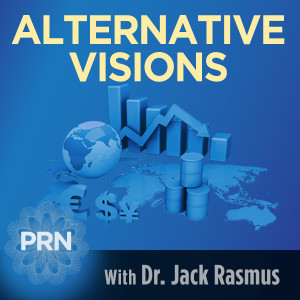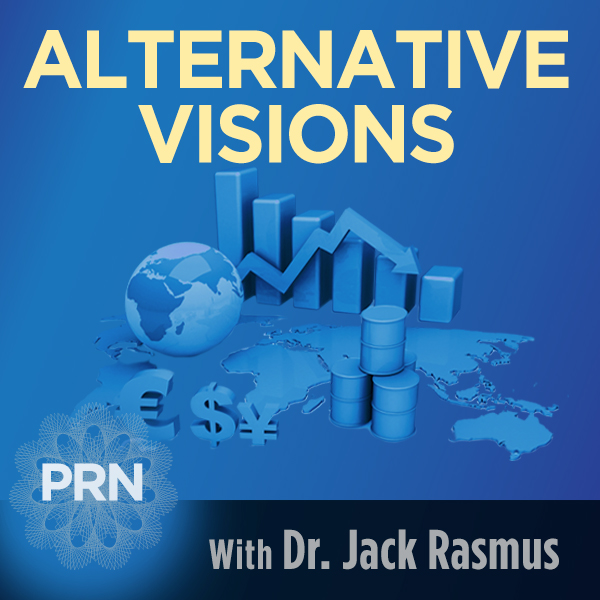Episodes

4 days ago
Alternative Visions- US Empire vs. Iran
4 days ago
4 days ago
Today's show picks up the discussion of last week on 'How US Goes to War' and comments on the Trump bombing of Iran last Friday. (For a print analysis of the bombing event read my recently published article, 'Trump's Forever War' on my blog, http://jackrasmus.com or on Counterpunch, LA Progressive, Z network and other sites). Today's show discusses Trump's tax bill, its real dimensions and why it will accelerate deficits, debt, and the fiscal crisis of the US imperial state, followed by what's behind Trump's bombing of Iran and why that war has just begun. The show concludes with further sharing of themes and analysis in my forthcoming book, 'Twilight of American Imperialism', Clarity Press, out later this year.

Monday Jun 23, 2025
Alternative Visions- How America Goes to War: Iraq, Ukraine and Now Iran
Monday Jun 23, 2025
Monday Jun 23, 2025
As Trump prepares the USA to directly attack Iran on behalf of Israel, it is clear he's repeating a pattern of past US decisions to go to war in recent decades. Today's show is based on my recent published article by the same title, available on my blog, http://jackrasmus.com and elsewhere in Counterpunch, LA Progressive, etc. How AMerica goes to war is about planning months before pulling the trigger; lining up political support and military assets, engaging in negotiations as a tactic to lull the opposition into thinking a deal is possible when it isn't, creating an excuse and even false flag event to precipitate and justify the attack, and once the attack has occurred pursuing the real objective of regime change. The show reviews US war events from Vietnam to the Iraq wars, the small attacks in the '80s and '90s on Grenada, Panama, Serbia, what happened in Ukraine, and the preparations for war with Iran by the US and Trump on behalf of Israel. Why Trump won't attack this weekend as originally planned and says two more weeks. Consequences if US bombing fails and regime change, the real goal, is not achieved.

Friday Jun 13, 2025
Alternative Visions- 'Israel-Iran War Escalates'
Friday Jun 13, 2025
Friday Jun 13, 2025
Today's show focuses on yesterday's Israel attack on Iran. Four key points about the escalation: 1) Netanyahu scuttles US-Iran negotiations 2) attack was not just to destroy Iranian nuclear weapons development but to decapitate Iran govt and military, create instability and possible regime change 3) Planning has occurred for months with US assistance and US knew of, and likely assisted, Israel in the attack 4) US neocons, with Trump support, continue to run US middle east policy. What will Iran do next? What about Iran-Russia mutual defense agreement recently signed? What will be the response of China? Other BRICS? Regional arab states? More to come. Report on recent EU new secondary sanctions on countries buying Russia oil and EU price-cap sanction lowered to $35/barrel. Why it didn't work at $60 and won't again

Friday May 30, 2025
Alternative Visions- Is the US Empire About to Collapse?
Friday May 30, 2025
Friday May 30, 2025
Today's show is dedicated to discussing the state of the US empire today. Contrary to some on the left, it is not about to collapse. But it is in a state of intensifying decline. Today's show reviews these two themes and considers the evidence for collapse vs. decline. A brief history how empires extract wealth from their dependencies (plunder, occupation, colonialism, unequal trade, financial imperialism, etc.) is discussed. A review of US institutions of Empire and how the US practices imperial dominance follows. Examples of institutional decline and failing practices are discussed: the US $, SWIFT payments system, IMF, World Bank, fiscal crisis of US empire and economy (deficits, debt, global dollar recycling, etc), contradictions in US monetary policies (why low interest rates don't stimulate growth and high rates don't dampen inflation), decline of US soft power, rise of the BRICS and global South, and chronic slow growth of US economy since 2008 as well as US political, social and ideological indicators of decline. (Discussion is based on Dr. Rasmus's forthcoming new book, 'Twilight of American Imperialism', the introductory chapter of which will be posted on his blog, http://jackrasmus.com on June 1, 2025)

Friday May 23, 2025
Alternative Visions- Recessionary Impacts of Trump's Tax-Spending Bill
Friday May 23, 2025
Friday May 23, 2025
Mainstream media isn't addressing the potential negative impacts on GDP and growth from Trump's 'Big Beautiful Bill' cutting taxes and spending by trillions of dollars. After reviewing in detail the various provisions of the US House of Representatives final bill, likely changed little by the Senate, today's show explains how the short term impacts of the spending cuts on GDP in 2nd half this year will likely more than offset the longer term effects of the tax cuts. Review of consumer spending, business investment, govt spending, and net exports impacts on GDP due to the tax and spending provisions of the bill.

Monday May 19, 2025
Monday May 19, 2025
Today's show discusses further details on Trump's 'Big Beautiful Bill' tax proposals. Why target total cost was reduced by Congress from $4.5T to $3.8T. Impacts on wealthies1% and,1% and median income households. Backtracking on 'working class' cuts (tips, overtime, social security income & no tax hikes on carried interest and stock buybacks or corporate tax cut rates, as the tax package begins to look more and more favoring capital incomes and businesses. Update on Ukraine war negotiations follows. Why Putin won't meet with Trump soon & Russia warns Ukraine if no settlement it will take a 5th province and maybe more. Russia new offensive coming soon. No real negotiations until fall 2025.

Monday May 12, 2025
Alternative Visions- Trump Tax Cut Legislation Details
Monday May 12, 2025
Monday May 12, 2025
Today's show focuses on pending $4 Trillion Tax Cuts soon acted on by US Congress as part of package of spending/budget. What's actually in the tax bill? Why is it being reduced to $4T? What about the proposed $1.1T in new working class tax cuts (tips, overtime pay, social security income, interest deduction on new car purchases, cap on state & local taxes, etc.). Will they pass? Why are corporate taxes not on the table, only individual income taxes? Why US has cut taxes by $17 trillion since 2001 despite spending $9 trillion on wars? Why was Obama the biggest corp-business tax cutter $6.1T)? How does Trump propose to cut spending to offset the tax cuts?

Monday May 05, 2025
Alternative Visions- Minerals Deal + 1st Quarter US GDP
Monday May 05, 2025
Monday May 05, 2025
Today's show dissects the Trump-Zelensky Minerals Deal finally signed, concluding it's not at all like Trump's first deal in March. No US repayment for past US aid in this one and a back door is opened in the deal for US giving Ukraine more weapons again. And why were 3 documents drafted but we only get to know of one? Second half of show discusses the preliminary US GDP for1st three months of 2025 showing a contraction of the US economy by -0.3%--due mostly to US businesses importing extra goods from offshore as a buffer for potential US tariffs on the horizon + US government spending cuts. Business investment continues rising (mostly inventories), housing and manufacturing contracting, and consumer spending rising at a rate half that of 4th quarter 2024.

Monday Apr 28, 2025
Alternative Visions- Trump's Ukraine War 'Kellogg Plan' Collapses
Monday Apr 28, 2025
Monday Apr 28, 2025
Much of today's show is dedicated to a detailed discussion of the various plans and proposals to start negotiations on ending the Ukraine war: Trump's revised 'Kellogg Plan', Europe's plan to continue the war, Ukraine and Zelensky's refusal to negotiate without Russia leaving all territory and capitulating, and Putin's June 14, 2024 proposals that haven't changed. To summarize: Ukraine, Europe & Trump want ceasefire first then negotiations; Russia wants negotiations to start during which ceasefire will be discussed. First phase of war negotiations now over; Trump's envoy Witkoff meeting with Putin again. Outcome begins start of next phase. The show also reviews various forecasts whether the US and global economy are heading to recession: IMF, UN, Wall St. Journal, Atlanta Federal Reserve, etc. (For more detail on Ukraine negotiations check out my latest published article: 'Why Trump's Ukraine War 'Kellogg Plan' Collapsed' at http://jackrasmus.com)

Monday Apr 21, 2025
Alternative Visions- Tariffs, the Fed and Ukraine Update
Monday Apr 21, 2025
Monday Apr 21, 2025
Today's show discusses latest events in Trump tariff policies. Not about paying for tax cuts but part of restructuring US empire financing. Why did Trump retreat from pace of tariff implementation? Answer: intense opposition from US multinational corporations to slow down implementation + Japan dumping US Treasuries. Trump launches verbal warning to Powell and Fed to start lowering interest rates, in repeat of 2017 Trump v. Powell conflict (which Trump won). Also, update on Ukraine war negotiations and emerging new Russian offensives. Prediction: US will exit war and Europe assume control. Europe wants to occupy western Ukraine as part of eventual settlement coming this year

